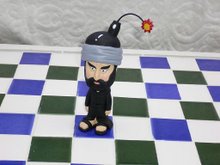
Surprising Study Reveals Muslim Communities Long to Be Acknowledged As Part
of Mainstream America
NEW YORK, April 30 /PRNewswire-USNewswire/ -- Many American Muslims
feel simultaneously overexposed in the media and invisible as part of the
American mainstream. But while they generally perceive themselves to be
under constant suspicion, a new study shows that Muslims still believe in
the American dream and are quietly living out traditional American values.
"One of the most crucial things to emerge from the study is that
American Muslims want to feel less singled out and to be simply
acknowledged and accepted," says Marian Salzman, executive vice president
and chief marketing officer of JWT Worldwide. "They're hyphenated Americans
in a country where religious observance is normal."
JWT, the largest advertising agency in the U.S. and the fourth-largest
in the world, commissioned this wide-ranging study on America's estimated 6
to 8 million Muslims; it includes in-depth interviews with noted American
Muslims, ethnographies of ordinary Muslims and a survey of 350 Muslims that
used face-to-face interviews. An adapted version of the survey was also
fielded online to more than 450 Americans representing the general
population.
"We quickly found out that Muslims have become wary of discussing
themselves and their faith," notes Salzman. "Many have felt a lot of
hostility directed at them and didn't want to risk expressing opinions on
anything vaguely controversial. It took a lot of effort to convince enough
Muslims that our study was purely market research, not for political
purposes."
Participants balked most notably at questions related to 9/11 and its
effects, adds Ann Mack, JWT's director of trendspotting. "America's
post-9/11 focus on Muslims has forced them to grapple with some tough
questions that few other Americans have had to face: How public should they
be about their faith? Should they stand up for it or avoid confrontation?
Are there conflicts of loyalty between their faith and their country?"
Among the key quantitative findings:
* Over two-thirds (69 percent) of American Muslims say they are often
judged by events outside their control, a view of Muslims shared by 60
percent of the general sample. At a time when Arabic names or Muslim
attire routinely attract unwelcome attention, more than half of Muslims
(53 percent) fear that their right to express their religion is under
attack, and 39 percent of the general population agrees with them.
* Much of Muslim angst is driven by widespread perceptions of anti-Muslim
bias in the media. Well over half of Muslims (57 percent) feel that
media coverage is always/mostly biased, and another third (34 percent)
feel it is occasionally biased. The general public senses an anti-Muslim
slant as well, with 25 percent agreeing that coverage is always/mostly
biased and 48 percent saying it's occasionally biased. More than
three-quarters (78 percent) of Muslims say they are increasingly angry
about the way the media characterizes and portrays Muslims.
* When it comes to the stuff of everyday life, however, Muslims are like
other Americans. Both Muslims and the general population place a high
priority on feeling safe outside their home (89 percent of both
samples), personal freedom (89 percent of Muslims vs. 93 percent of the
general sample), education (90 percent vs. 88 percent) and, to a lesser
extent for both, career (75 percent vs. 69 percent).
* On the topic of advertising, Muslims generally reflect mainstream
American views, with a slant toward the conservative. A little over 70
percent of both samples agreed advertisers should accept greater
responsibility for setting a moral standard. Sixty-nine percent of
Muslims vs. 59 percent of the general sample feel that most advertising
sets a low moral tone for younger and more easily impressed viewers; 60
percent of Muslims vs. 47 percent of the general sample agree that the
advertising they see is too suggestive or immodest.
* Muslims' biggest gripe with advertising is that it doesn't acknowledge
their existence: A high 71 percent of Muslims (vs. 34 percent of the
general sample) agreed that "Advertisers rarely show anybody of my
faith/ethnicity in their advertising," and 72 percent said that if they
felt advertisers generally wanted or appreciated the business of
Muslims, they would pay more attention to ads.
* While most Muslims (61 percent) feel that it's hard to be a Muslim in America, many are optimistic; indeed, 73 percent said they are confident
that Western society would one day accept Islam.
Muslims are not necessarily looking for marketers to provide any
specially targeted products, although Islam does require specific food and
packaged goods (halal), clothing (modest) and financial transactions
(shariah- compliant). What they are primarily looking for is acknowledgment
from marketers, says Mack. "The challenge and the opportunity for brands
are to connect with Muslims in a low-key way that recognizes their
American-ness and seeks to understand their particular attitudes."
"Every step of this study has been hugely instructive for us and for
our clients," says Salzman. "We started out with the intention of learning
about the 'Muslim community.' We quickly found out that there is no such
thing as a single American Muslim community, much as there is no single
Christian community. Muslims vary hugely by ethnicity, faith, tradition,
education, income and degree of religious observance, to name a few
factors."
JWT will make the study available to key clients and will also sell the
findings on its proprietary "smarts" Web site (http://www.jwtintelligence.com)
starting May 1. A comparable study of the Muslim market in the U.K
. will be
launched on May 21. The study was done in collaboration with Market Probe,
NoFormula and Attention Space.
About JWT
JWT ranks as the largest advertising agency brand in the United States
and as the fourth-largest full-service network in the world. Its parent
company is WPP (NASDAQ:
WPPGY). JWT's heritage of brand-building excellence
extends back to 1864, making us the world's oldest advertising agency
brand. In 1939, JWT pioneered the first national consumer research panel.
In 1988, we created the first research study of consumer lifestyles, "Life
Stages." We believe in being anthropologists first, advertising people
second.
Press Contact:
Alan Fox, Planned TV Arts











 212.593.5851
212.593.5851 
foxa@plannedtvarts.com












 212.593.5851
212.593.5851 





No comments:
Post a Comment